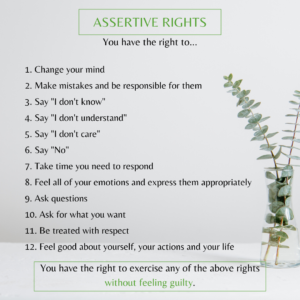
“Being assertive means that you are willing to hold up for yourself fairly – without attacking others.”
– Albert Ellis
We can all think of times when our boundaries were violated but we didn’t know how to protect them. When we knew we should speak up, but we didn’t. When we sensed that we were being taken advantage of, we just accepted it, unable to say NO. These are not pleasant situations, and they can easily leave us feeling neglected and powerless, seeming like whatever we do – confront or comply– we won’t feel good about ourselves. But there is a way to not feel guilty for expressing your thoughts and feelings and defending your rights. The key is – learning how to communicate assertively.
What Is Assertiveness?
Assertiveness is the skill of communicating your opinions, wants, and needs openly and honestly, while also considering the opinions and needs of others. It refers to being able to recognize our rights whilst still respecting the rights of others. Assertive people don’t shy away from defending their points of view or standing up for their goals but do that respectfully and politely.
Assertiveness starts with recognizing two main things: your core values and your (and other people’s) assertive rights.
Your core values are the fundamental beliefs and principles that guide your behavior. They reflect what is important to you, who you want to be, and how you want to live your life. Your core values help you set priorities and provide direction and criteria that influence your personal decisions. When we live in alignment with our core values, we derive a sense of fulfillment and, often, a higher level of confidence in our choices. Thus, defining your core values is critical for setting priorities and feeling self-confident when setting boundaries or standing up for your rights.
Assertive rights highlight people’s freedom to be themselves and take responsibility for their choices. When you are assertive, you know your rights and also know that others have them too. From there, you are self-assured and draw power from this to get your point across firmly and fairly, without disrespecting others.
Assertiveness As a Sweet Spot Between Passive And Aggressive Communication
Assertiveness is a core social skill because it dramatically helps in delivering your message successfully. If your communication style is too passive or too aggressive, your message may get lost because people either won’t recognize or acknowledge your rights and needs or will be too busy defending themselves.
With a passive communication style, you’re sending the message that your needs, thoughts, and feelings are less important than the needs, thoughts, and feelings of others. Not being able to express yourself honestly, or doing it over-apologetically and feeling guilty about it, putting yourself down, and shying away from saying NO are all signs of passive communication style. Although your intention may be to keep the peace and increase the chances of other people liking you, this kind of behavior easily permits others to disregard your wants and needs, which can quickly lead to building up stress, resentment, and anger, which can damage your relationships.
On the other hand, with an aggressive communication style, you don’t have a problem stating your thoughts, needs, and feelings, and do so in a very open way. However, this style sends the message: “I am right and you are wrong!” The main difference between assertiveness and aggression is that the first is about balance, while the second is about winning. Being assertive means you consider your rights and the rights of others as equally important. There is a big difference in the words used, the tone of the voice, and in body language used. Assertive people are firm without being rude. Aggressive people demand what they want while dismissing others’ wants and needs and violating their rights. You can make choices for yourself, and that is what assertiveness is about. But when you make choices for others, that is aggressive.
Assertiveness includes:
- Being open about your thoughts and wishes, and encouraging others to do the same
- Being solution-oriented
- Realizing you have the freedom but also the responsibility for your decisions and actions
- Being able to admit mistakes and apologize
- Having the confidence to stand up for your rights when they are violated
- Behaving as equal to others – not above, not below
Assertiveness is a sweet spot between passivity and aggression, and like any skill, it can be developed and improved through practical exercises and experience.
Benefits And Risks of Practicing Assertiveness
Learning assertiveness skills can help you:
- Politely and effectively say NO
- Negotiate win-win situations
- Feel good about yourself and others
- Decrease stress and anxiety
- Set healthy boundaries
- Communicate more clearly and openly
- Develop your leadership skills
- Protect yourself from being taken advantage of
It’s important to note that assertiveness is not a tool for “getting what you want”. Being assertive is about choice, responsibility, and healthy boundaries. It may increase the chance of getting what you want by promoting open communication and respect but is by no means a guarantee for a positive outcome.
Sudden use of assertiveness may be mistaken for aggressiveness by others, especially by individuals with a passive style of communication. Also, be aware that some organizations and cultures prefer people to be passive, and can find assertive communication rude or offensive.
Assertiveness Training can teach you how to speak assertively, use appropriate body language, understand your rights in interpersonal situations, allow you to practice, and much more. If you think assertive training is something that you need, be free to contact us for more details.
If you like this blog post, please feel free to share it on your social media.
 What is your communication style? How difficult do you find being assertive? Let us know your opinion in the comment section below!
What is your communication style? How difficult do you find being assertive? Let us know your opinion in the comment section below!
Interested in learning more about coaching or therapy? Contact us today.
Sources:
Smith, M. J. (2008). When I say no, I feel guilty. Pacifica Tape Library.




